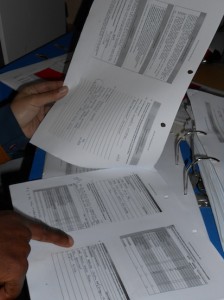
The Cape Town CIVNET study is a survey based research project that has interviewed over 130 civil society organisations in Cape Town. It is based on similar studies in Bristol and Glasgow by Mario Diani, and a study in Stockholm by Henrik Ernstson. Part of the research process meant to critically reflect how to translate this survey from these European cities to Cape Town.
The “Cape Town Civic Network Study” is a research project based on a social network survey that focuses on the urban environment and environmental justice. We have interviewed over 130 civil society organisations in Cape Town during 2013 and 2014, organised group discussions in October 2014 and The Cape Town Civil Society Conference in 6 June 2015 . You can read more about the project here.
Rather than only focusing on ‘green’ environmentalist issues like habitat protection and nature conservation, the study uses a political ecological lens of the urban environment including struggles over access to basic services like water, electricity, housing and sewage. It also broadens the type of cities where social network analysis (SNA) have been carried out in studying environmental and social movements, which mainly has been in the US and Europe. More studies in previously colonised and so called ‘developing countries’ are needed.
Through organizing meetings and and a conference we have also tried to expand and situate this survey-based research method better, making use of the contacts we have created with skilled organisers for them to meet and debate the democratic project of Cape Town from their varied experiences and histories. More work on reflecting on that experience is needed.
Here is a short list of updates in the project.
Update CIVNET – as of August 2015
- During 2015 more analysis of the 129 organisations have been carried out. This relational database have also been used to prepare for group discussions and a large conference.
- Organized 5 group discussions with in total 25 spokespersons in October 2014. During these we presented emergent findings from our analysis to generate discussions to increase our ability to do grounded interpretation of the data. This was also a chance for organisers to ‘speak back’ to our results before we presented it elsewhere. In particular the group discussions focussed on what facilitates and hinders collaboration, the role of apartheid spatial legacies, the role of the state of so called public forums used by the city, and general questions about the state of democracy in Cape Town and South Africa. Many expressed that they had been helped in thinking about their own organisations and that they had made contacts with other groups.
- Organised The Cape Town Civil Society Conference on 6 June 2015 at the University of Cape Town. Based on extensive field research and the relational database, and the group discussions we invited organisations to discuss our emergent findings in the context of environmental issues broadly and the deepening of the democratic project of Cape Town. The morning started with hip-hoppers Emile Jansen and the group Mixed Mense with Leeroy and Stefan. This helped to foreground the conference in the rich and varied experience about organizing in the city, which those attending brought to the conference. Professor Peter Alexander reflected on historical and contemporary challenges of civil society and the increasing use of violence and securitisation of the state in policing public meetings in South Africa. Professor Mario Diani developed ideas from having studied collective action in different places and cities in the world. Dr. Henrik Ernstson presented initial results from the CIVNET study. This was followed with group discussions and presentations by those attending. Over 60 attended the meeting from some 40 different organisations. More information here.
Early results have been presented (not exhaustive list) and publications and reports are being prepared:
- Dr. Henrik Ernstson presented at SESYNC in Maryland in May 2015, and at University of Maryland, also in May 2015.
- Professor Mario Diani has presented from this project at INSNA in June 2015 and earlier in Spain.
- Dr. Lorien Jasny has also presented at INSNA in June 2015.


